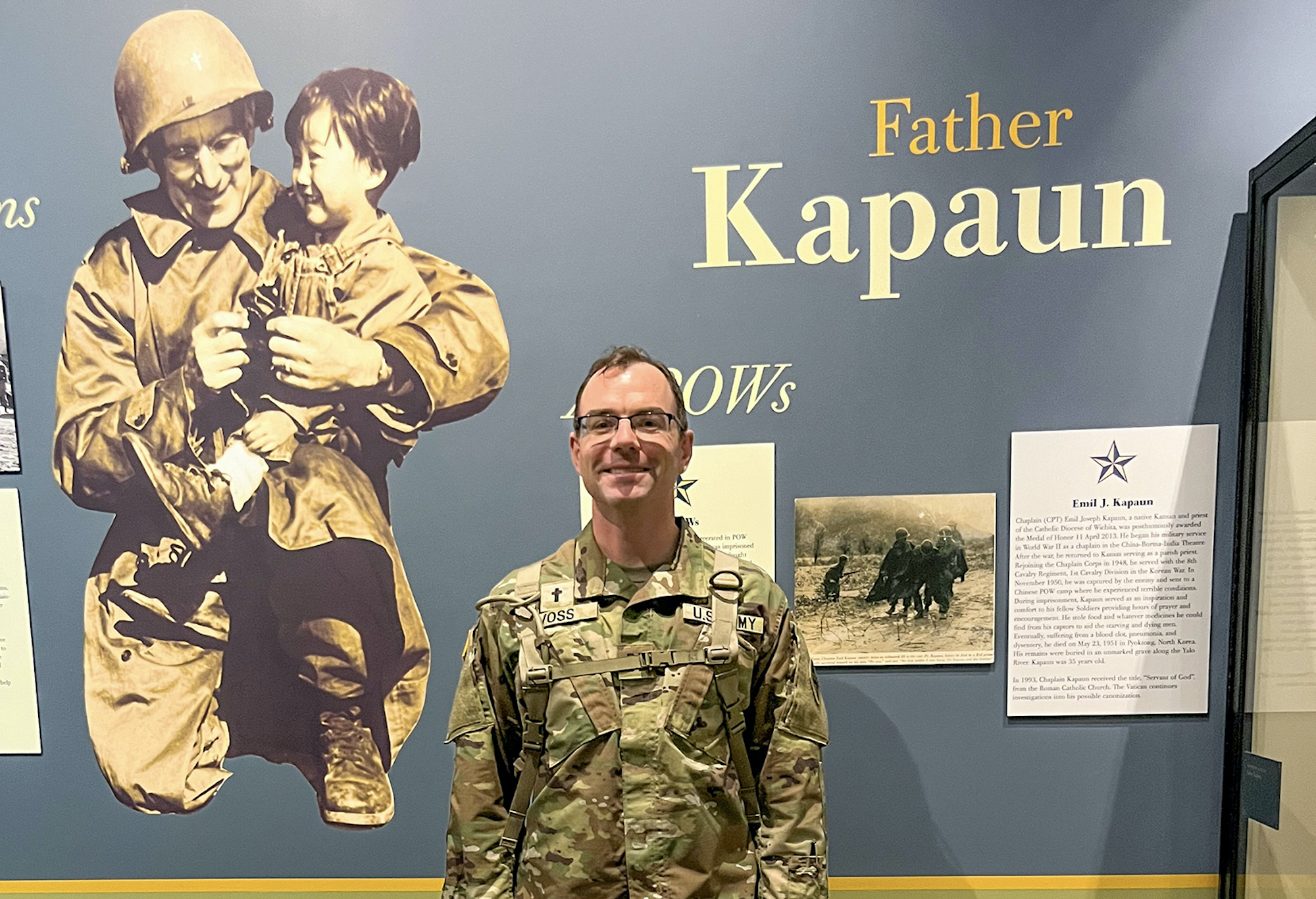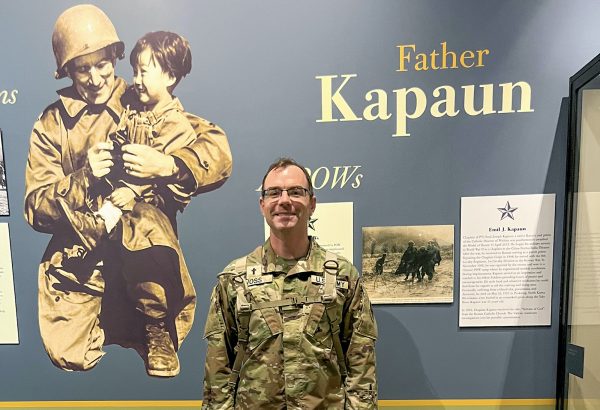
Fr. David Voss following the boot steps of Fr. Emil Kapaun

Fr. David Voss stands at attention in front of a display about Fr. Emil Kapaun at Fort Jackson, South Carolina. Father is a priest of the Diocese of Wichita on loan to the U.S. Army. (Courtesy photo)
Fr. David Voss’ friends and family were concerned about basic training after he told them Bishop Carl A. Kemme had approved his request to follow Fr. Emil Kapaun’s footsteps into the chaplaincy of the U.S. Army.
He and his fellow officers began training on Jan. 19 in drill and ceremony, conquered obstacle courses, tackled repelling towers, crawled under direct fire of machine guns at night, and learned about chemical exposure.
The Basic Officer Leadership Course for Direct Commission Officers – for chaplains, doctors, and lawyers – isn’t as intense as the basic course for the enlisted personnel, Fr. Voss said last week, but it’s not a walk in Fort Jackson, South Carolina’s, park either.
Training will soon be over
Fr. Voss will finish his training on April 20.
“Our average age is much older than a true basic school, so our events are modified,” he said. “When we come back to our rooms with face paint and we’re all muddy, the other soldiers are impressed that the chaplains have to go through all those events too.”
Apparently his family, friends, and brother priests have been praying for him because Fr. Voss recently learned where his first station will be: Fort Riley, Kansas.
The training he went through was similar to seminary preparation, he said, because he was instructed about the basics of ministering to his soldiers. “Everybody comes here with different levels of ministry. They have many of the basic elements: how to be a counselor, how to give good support, how to comport (conduct) yourself well – what we would call human formation.”
Not unlike the seminary
Fr. Voss said some of the training is similar to what he received in the seminary but was necessary because many of the chaplain candidates (those not yet ordained) take a combination of online and in-person classes.
“It’s part seminary combined with Army training,” he said. “You have to learn the basic things of drill ceremony: how to stand at attention, how to walk correctly, follow orders, and do cadences. And there’s PT in the morning.”
A cadence is a call-and-response work song sung by military personnel while running or marching.
“We make sure when we’re supposed to be somewhere to be there at the right time, with the right uniform, and the right attitude.”
Three other priests with him
The number of trainees varies but there are about 70 in his class – including three other Catholic priests, Fr. Voss said. Some of his classmates are on active duty and others are being trained for roles in the National Guard and Reserves. “They adjust the course for whatever situation you’re in.”
In addition to the physical training, the officers memorized a dictionary of acronyms, one of which is PCS or permanent change of station.
Fr. Voss’ PCS will be only 117 miles from Wichita, making his four allotted days of moving relatively easy. He will also get a week to settle and rest before he begins duties at Fort Riley.
“A very important part of being an Army soldier is to have good support because we ask all of our soldiers to do so much for our country. They need to be honored for what they do but also be given the right support, including religion.”
Soldiers have a right to that support, he said.
Spiritual support vital
“One of the things I take away from all of this training is how important and how vital it is for our soldiers who go through so much stress day in and day out,” Fr. Voss said. “This ministry is not just important but essential to what they go through in all areas of their lives, not just on base but for their families and friends and parishes back home.”
He said he’s learned a lot about Army culture and the daily life of a soldier.
“I see the enlisted men and women on Mass on Sundays – 500 18- to 22-year-olds – going through basic training and their life is hard,” he said. “They’re asked to do a lot they are under a lot of stress. One of the good parts of their lives is to be connected to what gives them immense support.”
Soldiers face challenges
Basic training helps young men and women prepare their hearts to do something better in their lives, Fr. Voss said.
“They are ready for a big change and they’re ready for God to guide them,” he said, adding that their training and the Army culture molds the soldiers to redirect their lives in a better direction.
“That’s a beautiful service the Army does for them. No one really likes that process. But that’s one of the great opportunities our young men and women have: to learn what it means to live their lives for someone else. If they’re Catholic, they realize God loves them, guides them, and walks that journey with them no matter what happens. I find great joy in seeing that process happen.”
